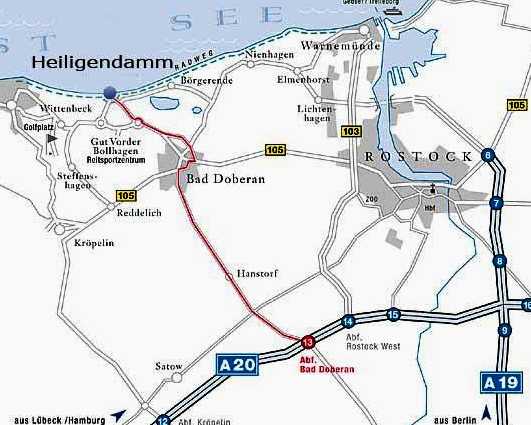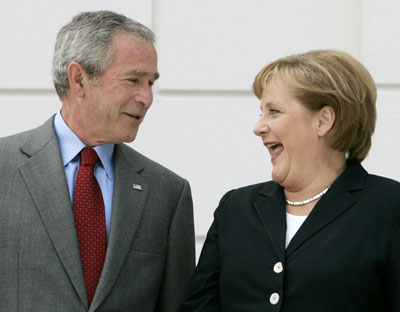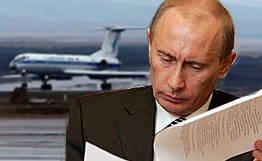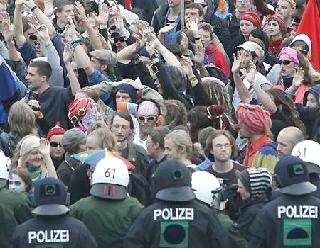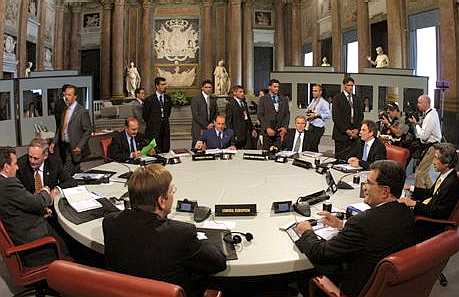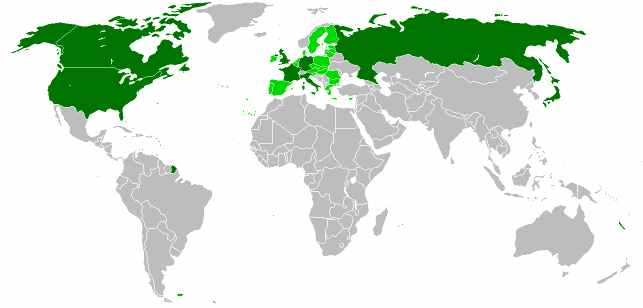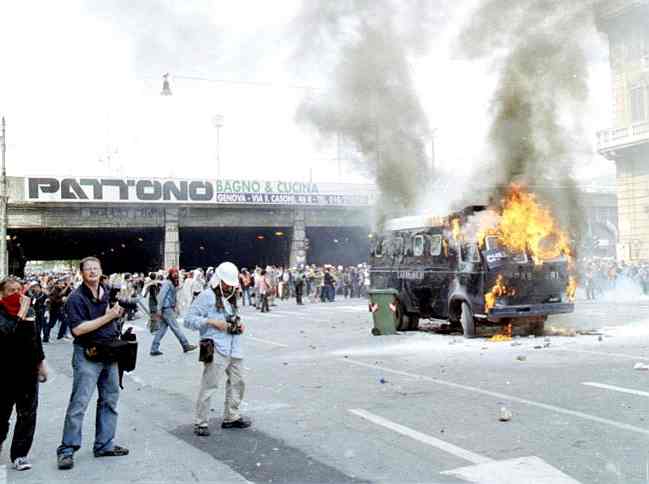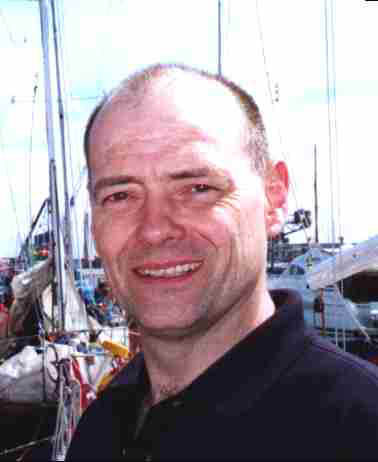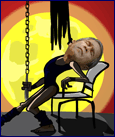|
G8 SUMMIT HEILIGENDAMM
|
||||||||||||||||||||||||||||||||||||||||||||||||||||||||||||||||||||||||||||||||||||||||||||||||||||||||||||||||||||||||||||||||||||||||||||||||||||||||||||||||||||||||||||||||||||||||||||||||||||||||||||||||||||||||||||||||||||||||
|
HOME | BIOLOGY | FILMS | GEOGRAPHY | HISTORY | INDEX | INVESTORS | MUSIC | NEWS | SOLAR BOATS | SPORT |
||||||||||||||||||||||||||||||||||||||||||||||||||||||||||||||||||||||||||||||||||||||||||||||||||||||||||||||||||||||||||||||||||||||||||||||||||||||||||||||||||||||||||||||||||||||||||||||||||||||||||||||||||||||||||||||||||||||||
|
The Group of Eight (G8), formerly G7 until Russia joined, is an international forum for the governments of Canada, France, Germany, Italy, Japan, Russia, the United Kingdom and the United States. Together, these countries represent about 65% of the world economy. The group's activities include year-round conferences and policy research, culminating with an annual summit meeting attended by the heads of government of the member states. The European Commission is also represented at the meetings.
Each year, member states of the G8 take turns assuming the presidency of the group. The holder of the presidency sets the group's annual agenda and hosts the summit for that year. The presidency for 2007 belongs to Germany, which will host the 33rd G8 summit in Heiligendamm from June 6 to June 8.
G8 location map - Heiligendamm, Germany
NEWS
Demonstrations - Protesters disrupt start of G8 summit June 6 2007 13:09
Thousands of anti-globalisation protesters have disrupted the start of the Group of Eight wealthy nations summit by blocking roads and a rail track near the summit venue in Heiligendamm. Up to 6,000 protesters were involved in the blockades on Wednesday morning near the security fence around the summit, according to estimates in the German media.
Meanwhile, German police used water cannon and tear gas against demonstrators protesting against the G8 summit as leaders arrived for the meeting, a police spokesman says. "Water cannon and tear gas were used after protesters began throwing stones," the spokesman said.
The demonstrators had approached the 12-kilometre-long fence around the luxury hotel on the Baltic Sea where the summit is being held. Thousands of other protesters tried to block roads leading from the nearby city of Rostock to Heiligendamm in an effort to prevent officials from reaching the meeting.
Violence flared at a demonstration against the summit in Rostock on Saturday when hundreds of police were injured in clashes with masked and hooded protesters. About 16,000 police were on duty for the summit. The leaders of the G8 nations - Britain, Canada, France, Germany, Italy, Japan, Russia and the United States - gathered in Heiligendamm for three days of talks focusing on climate change and development aid to Africa.
Several roads leading to the summit were blocked by protesters, taking both police and the German summit organisers by surprise. Police used water cannon and tear gas to disperse the crowds, according to the demonstration organisers. Black-clad left wing militants were also seen among the demonstrators. On Saturday, riots involving such militants caused almost a thousand injuries in Germany's worst clashes in decades.
Hundreds of journalists, based in a media centre near Heiligendamm, were prevented from travelling to press conferences at the summit on Wednesday because a special train service due to take them had stopped running. Television footage showed protesters walking along the rail tracks between Heiligendamm and the press centre.
A German official involved in summit logistics for journalists said: "Everything is moving very fast, but at present we are cut off from Heiligendamm". The blockades could disrupt the arrival of several G8 leaders who are due to arrive at the airport in Rostock, east of Heiligendamm. Traffic around the town on the Baltic coast was severely disrupted on Wednesday, also due to police road blocks.
The disruptions come despite a flurry of court rulings in recent days in which protesters were banned from approaching the 12km security fence around Heiligendamm. To avoid police controls thousands of protesters on Wednesday morning walked across fields to approach the fence, eyewitnesses said. The disruptions are embarrassing for the German government, which has spent over €90m on security measures for the summit and deployed 16,000 police, a record number.
George Bush and Angela Merkel at G8 summit
US rejects emissions targets ahead of G8 summit
The United States says it will not agree to climate change targets ahead of the Group of Eight (G8) summit which has already been marred by a row over US missile defence plans. A top US climate official has rejected German Chancellor Angela Merkel's plan to cut emissions by 50 per cent saying the G8 should not dictate members' policies.
US President George W Bush's senior climate adviser James Connaughton says a number of countries - including the US - will not sign up to those commitments. He says the US believed efficiency goals should be decided and developed on a national basis.
LOCAL VIEW
The
SPD Minister of Mecklenburg-Western Pomerania, Harald Ringsdorff, is
pleased the G8 summit will take place in Heiligendamm in 2007.
Vladimir Putin leaving Moscow for G8 summit
RUSSIA
Russia took a fresh swipe at the United States on Tuesday over its missile shield plans, raising tensions on the eve of a big power summit that could also expose divisions on climate change and aid for Africa.
Meanwhile, US President George W. Bush, on a European tour centered on the June 6-8 meeting of Group of Eight (G8) leaders in Germany, was preparing to give a speech in Prague that could further upset relations with Russian President Vladimir Putin.
Speaking in Seoul, Russian Foreign Minister Sergei Lavrov repeated that US plans to install a missile defence shield in central Europe to guard against what it calls "rogue states" like Iran and North Korea did not reflect military reality.
"What we all need is to join our efforts to fight real, not hypothetical, threats. And for this work, Russia is ready," Lavrov told Reuters on the sidelines of a conference in the South Korean capital.
Putin, who will meet Bush at the summit, has said that if Washington pushes ahead with its plans to deploy parts of the missile shield in Poland and Czech Republic, Russia will revert to targeting its missiles on Europe as it did in the Cold War.
US officials said Bush, in his speech, would hail democratic strides made by former communist satellites like the Czech Republic.
It was unclear how far he would go in attacking the Kremlin over what Washington sees as moves to curb freedoms, but the White House made clear both Russia and China would be mentioned.
Verbal exchanges over the US missile shield plans have set Russia and the United States on a collision course ahead of the summit in Germany, though the tradition of G8 such gatherings is to paper over differences publicly.
On Monday, US and NATO officials criticized Putin for his warning to target Russian missiles on Europe. "These kind of comments are unhelpful and unwelcome," NATO spokesman James Appathurai said.
German Chancellor Angela Merkel holds the rotating presidency of the G8 and will host the meeting of leaders from Britain, Canada, France, Italy, Japan, Russia and the United States at the elegant beach-side Kempinski Grand Hotel in Heiligendamm.
G8 summit Germany protestors June 2007
EYES ON BALI
She had hoped to secure G8 backing for new targets on cutting greenhouse gas emissions that scientists warn could prompt ever increasing heatwaves, floods and rising seas if not brought under control.
But new climate change proposals from Bush last week have shifted the focus of German "sherpas", who were meeting on Tuesday with their G8 counterparts to put the finishing touches on summit declarations to be made by the leaders.
European Union countries fear the Bush plan could sabotage efforts to produce a successor to the Kyoto Protocol under the auspices of the United Nations. They are now hoping to convince Bush to integrate his proposals with the UN process or send a clear signal at the summit that they do not compete with it.
The German hosts and their European partners hope the summit can give a political impetus for a UN climate conference due to take place in Bali, Indonesia in December.
"I welcome President George W. Bush's recent declaration that he, too, will launch an American climate initiative," UN Secretary-General Ban Ki-Moon wrote in a contribution to the International Herald Tribune on Tuesday.
"I urge that this take place within the UN.'s global framework for discussion, so that our work may be complementary and mutually reinforcing," he added.
Informal meetings of the world's top industrial powers date back to 1975, when the G6 (Canada joined in 1976 and Russia in 1998) gathered in Rambouillet, France, to coordinate economic policy following a global oil crisis and the collapse of the Bretton Woods system of fixed exchange rates.
In Heiligendamm, the leaders will discuss foreign policy issues including Iran's nuclear program, Middle East peace, Sudan and Kosovo.
The German hosts are also aiming to secure new G8 pledges on development aid and AIDS funding for Africa, but differences were evident before the summit even began. Anti-poverty campaigner Bob Geldof told Reuters on Monday that Canada was blocking an agreement that would reconfirm aid commitments made at a 2005 G8 summit in Gleneagles, Scotland.
"All our information says they are refusing point blank to allow concrete figures," said Geldof. "They are very, very far behind what they said they would do at Gleneagles." Canada quickly rejected the allegations, saying Geldof did not know what he was talking about.
G8 work session; July 20–22, 2001
HISTORY
The concept of a forum for the world's major industrialised democracies emerged following the 1973 oil crisis and subsequent global recession. In 1974, the United States created the Library Group, an informal gathering of senior financial officials from the United States, the United Kingdom, West Germany and Japan in Valéry Giscard d'Estaing invited the heads of government from West Germany, Italy, Japan, the United Kingdom and the United States to a summit in Rambouillet. The six leaders agreed to an annual meeting organized under a rotating presidency, forming the Group of Six (G6). The following year, Canada joined the group at the behest of U.S. President Gerald Ford, and the group became known as the Group of Seven (G7). The European Union is represented by the President of the European Commission and the leader of the country that holds the Presidency of the Council of the European Union and have attended all meetings since it was first invited by the United Kingdom in 1977.
The Cold War ended with the dissolution of the Soviet Union in 1991, and Russia became the successor state. Beginning with the 1994 Naples summit, Russian officials held a separate meeting with leaders of the G7 after the main summit. This group became known as the Political 8 (P8), or colloquially as the "G7 plus 1". At the initiative of United States President Bill Clinton, Russia formally joined the group in 1997, resulting in the Group of Eight (G8). This was partly a gesture of appreciation from Clinton to Russian President Boris Yeltsin, who steadfastly pursued economic reforms in Russia and remained neutral to the eastward expansion of NATO. This decision is not without its detractors; on February 18, 2005, United States Senators Joe Lieberman and John McCain called for Russia to be suspended from the G8 until democratic reforms and political freedoms in Russia are ensured by Russian President Vladimir Putin.
Members world map - 33rd G8 summit 2007
Structure and activities
The G8 is intended to be an informal forum, and it therefore lacks an administrative structure like those for international organizations, such as the United Nations or the World Bank. The group does not have a permanent secretariat, or offices for its members. The presidency of the group rotates annually among the member countries, with each new term beginning on January 1 of the year. The country holding the presidency is responsible for planning and hosting a series of ministerial-level meetings, leading up to a mid-year summit attended by the heads of government.
The ministerial meetings bring together ministers responsible for various portfolios to discuss issues of mutual or global concern. The range of topics include health, law enforcement, labour, economic and social development, energy, environment, foreign affairs, justice and interior, terrorism and trade. The best known of these meetings is the G7, which refers specifically to the annual meeting of financial ministers from the seven member countries excluding Russia. There are also a separate set of meetings known as the "G8+5", attended by finance and energy ministers from all eight member countries in addition to the People's Republic of China, Mexico, India, Brazil, and South Africa; created at Gleneagles, Scotland in 2005, primarily to reach a consensus statement on a post 2012 Climate Change settlement. As well, representatives from the European Commission are present at all G8 meetings.
Under the auspices of G7, a special program for the implementation of the Information Society was established in 1994. The Global Information Society held meetings during February 25–February 26, 1995 in Brussels, and during May 13–May 15, 1996 in South Africa.
In June 2005, justice ministers and interior ministers from the G8 countries agreed to launch an international database on paedophiles. The G8 officials also agreed to pool data on terrorism, subject to restrictions by privacy and security laws in individual countries.
Also in June 2005, the national science academies of the G8 countries signed a statement on the global response to climate change, joined by Brazil, the People's Republic of China and India, three of the largest emitters of greenhouse gases in the developing world, behind the United States which produces 25% of all emissions. The statement stressed that scientific understanding of climate change is sufficiently clear to justify nations taking prompt action, and explicitly endorsed the consensus of the Intergovernmental Panel on Climate Change.
Annual summit
The annual G8 leaders summit is attended by eight of the world's most powerful heads of government. As such, it is an international event that is keenly observed and reported by news media. The member country holding the G8 presidency is responsible for organizing and hosting the year's summit, usually held for three days in mid-year.
Economic power
The eight countries making up the G8 represent about 14 percent of the world population, but they account for nearly two thirds of the world's economic output measured by gross domestic product.
Protesters try to stop members of the G8 from attending the summit during the 27th G8 summit in Genoa, Italy by burning vehicles on the main route to the summit
Criticism and demonstrations
As the annual summits are extremely high profile, they are subject to extensive lobbying by advocacy groups, street demonstrations by activists and, on rare occasion, terrorist attacks.
The most well-known criticisms center on the assertion that members of G8 are responsible for global issues such as poverty in Africa and developing countries due to debt crisis and unfair trading policy, global warming due to carbon dioxide emission, the AIDS problem due to strict medicine patent policy and other problems that are related to globalization. G8 leaders are therefore pressured to take responsibility to combat problems they are accused of creating. For example, Live 8, a series of concerts in July 2005 to coincide with the 31st G8 summit, was intended to promote global awareness and to encourage G8 leaders to "Make Poverty History." Live 8 organizers have also proposed that G8 member nations adjust their national budgets to allow for 0.7% to go towards foreign aid as outlined in Agenda 21 of the 1992 Rio de Janeiro Earth Summit.
Another criticism revolves around the membership of the G8. With the exclusion of the People's Republic of China, the G8 no longer represents the concentration of economic power it did when it was created. Also, recent nominal GDP figures published by the World Bank suggest that Spain has replaced Canada as the eighth largest economy in the world. The lack of representation from the 'global south' leads many critics to label the G8 as an institution to continue western economic domination.
Of the anti-globalization movement protests, the largest and most radical was that of the 27th G8 summit in Genoa in 2001. Summits since have been hosted outside of major cities. The opening day of the 2005 summit meeting in Scotland was accompanied by a series of synchronized terrorist bombings in London, killing dozens and derailing the summit agenda. A previously unknown Islamist group claimed responsibility for the bombings.
LINKS and REFERENCE
Nelson Kruschandl - "We have a long way to go, so lets pull together"
Global Warming | Waste Recycling | Climate Change
MORE ON AGENDA 21 MEMBERS OF PARLIAMENT A-Z HOUSE OF LORDS A-Z COUNCIL'S AGENDA 21
President Bush loves oil - Watch "Climate Mash"
ACT NOW: Ask your MP to urge Tony Blair not to turn his back on climate change (90 seconds is all it takes).
Or read more first Thank you for your support - the Climate Change Campaign Team
CLIMATE CHANGE: RELATED STORIES
"The Climate Mash" is hilarious, but the effects of global warming aren't funny. Global warming puts our health, our economy and our environment at risk. It's time to demand that major polluters like ExxonMobil and others stop resisting solutions that could make a real difference.
Your voice is needed to overcome the polluters who are trying to bury clean energy solutions. NOW is the time to tell your elected representatives in Washington that you want their commitment to solving global warming.
Healthier alternative tastes for adventure capitalists
Solar Red | Solar Crush + | Solar Cola | Solar Citrus + | Solar +
|
||||||||||||||||||||||||||||||||||||||||||||||||||||||||||||||||||||||||||||||||||||||||||||||||||||||||||||||||||||||||||||||||||||||||||||||||||||||||||||||||||||||||||||||||||||||||||||||||||||||||||||||||||||||||||||||||||||||||
|
This website is Copyright © 1999 & 2007 NJK. The bird logo & name Solar Navigator and Solar Cola are trademarks. All rights reserved. All other trademarks are hereby acknowledged. Max Energy Limited is an educational charity. |
||||||||||||||||||||||||||||||||||||||||||||||||||||||||||||||||||||||||||||||||||||||||||||||||||||||||||||||||||||||||||||||||||||||||||||||||||||||||||||||||||||||||||||||||||||||||||||||||||||||||||||||||||||||||||||||||||||||||
|
AUTOMOTIVE | BLUEBIRD | ELECTRIC CARS | ELECTRIC CYCLES | SOLAR CARS |
